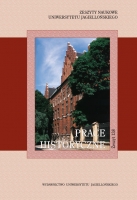Reforma Jędrzejewicza w państwowym szkolnictwie akademickim II Rzeczypospolitej. Wzmocnienie prerogatyw władz państwowych
Jędrzejewicz’s reform and the national higher education system in the Second Polish Republic. Strengthening the prerogatives of national authorities
Author(s): Jarosław JastrzębskiSubject(s): History
Published by: Wydawnictwo Uniwersytetu Jagiellońskiego
Keywords: Jędrzejewicz’s reform; higher education system; Second Polish Republic; Minister of Religious Beliefs and Public Enlightenment; polish history
Summary/Abstract: The aim of the article is to present the changes introduced by the so-called Jędrzejewicz’s reform of 1933 to the competences of the national authorities in the fi eld of higher education system and to compare these changes with the previous state of affairs. Special emphasis is placed upon the growth of supervisory competencies of the Minister of Religious Beliefs and Public Enlightenment. The paper uses source documents and is fundamentally based on the analysis of the national legal acts of 1920–1939, supplemented by references to a few statutes of selected academic institutions and reference texts. The paper is divided into fifteen chapters. It starts with a brief outline of the national higher education system and the classification of schools (to the extent adequate for the main subject of the paper). The legal basis for the higher education system and the political background of the reform are also described. Further chapters focus on the elements used in the process of strengthening the prerogatives of the authorities in relation to academic institutions and the importance of such prerogatives for academic autonomy and freedom of science. The following issues have been considered of key signifi cance: the possibility of suspending an entire school or part of it; restriction of a university’s freedom in electing vice-chancellors; strengthening the supervision of collegial and self-government authorities (by means of the general assembly of professors, senate, and the board of the faculty); changes to the rules of setting up and closing down organisational units and professorial chairs; special status of military students. The fi nal part of the paper provides a comprehensive summary in which the author highlights the positive aspects of the reform as well as the restrictions it places on academic freedom. As far as the latter is concerned, the most important changes are: the authority granted to the Minister of Religious Beliefs and Public Enlightenment to temporarily close down an entire school, or some part of it; the necessity of obtaining state approval for electing both a vice-chancellor and pro-vice chancellor, and for passing regulations of the senate and board of the faculty; transferring the authority of appointing directors of research units and of closing down chairs to the national level, which was a serious blow to academic freedom.
Journal: Prace Historyczne
- Issue Year: 138/2011
- Issue No: 1
- Page Range: 159-176
- Page Count: 18
- Language: Polish

